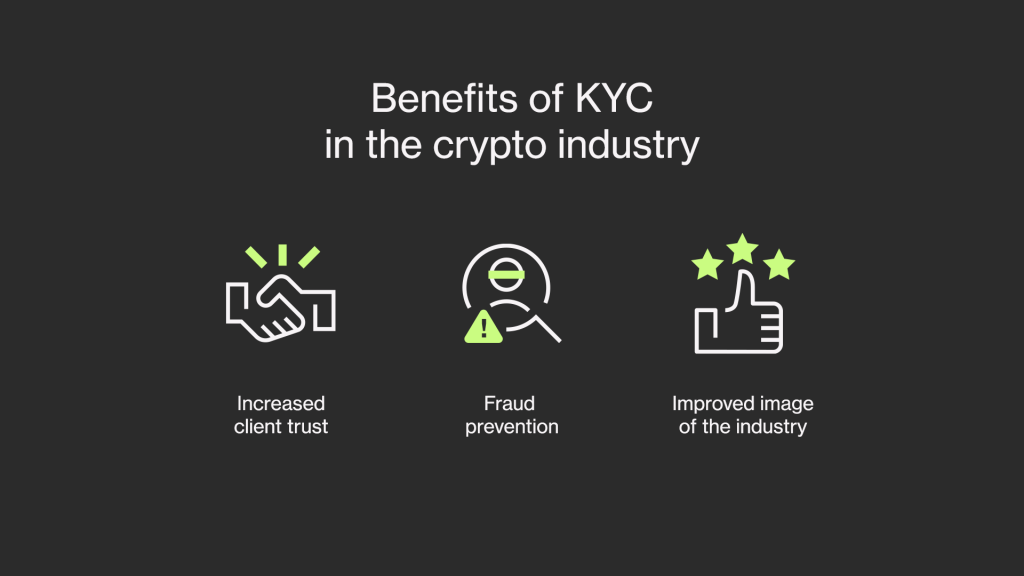The so-called Wild West of the crypto market is coming to an end. Recently, the European Union finalized MiCA, a new crypto regulation that aligns with the EU’s anti-money laundering directive. Many countries around the world are also introducing regulatory requirements for digital assets, such as cryptocurrencies.
The new KYC regulations require crypto exchanges and other businesses to implement full-fledged KYC and AML procedures, establish an in-house compliance department, and ensure effective privacy and security checks. Companies that fail to comply risk losing their operating licenses and paying large fines.
However, penalties aren’t the only reason to implement KYC procedures; they can also provide important benefits for business continuity. Continue reading to find out why KYC is essential for the cryptocurrency industry.
What Is KYC in Crypto?
Know Your Customer (KYC) is a control mechanism to verify a client’s identity before granting access to a service. Depending on the regulatory requirements, the KYC verification process may include several due diligence procedures, such as sanctions screening, politically exposed persons screening, and, most commonly, checking the lost and found document registry. Along with identity verification, the Know Your Customer process assists in calculating a risk score.
Typically, the regulations require providers to gather identifying information during onboarding or when a particular transaction amount is reached. This means that each new client should provide a photo of a valid ID as well as a selfie.
Some new and inexperienced cryptocurrency providers continue to request this sensitive information via email or customer support chat. Others use tools to automate the process but often fail to choose an effective solution.
However, rising privacy concerns have compelled providers to up their game and implement advanced and secure methods of collecting and verifying client information.
What Does Crypto KYC Look Like?
In countries where crypto regulations have been imposed, the KYC requirements for cryptocurrency typically include three major steps.
- The crypto provider collects the customers’ personal information, such as full name, date of birth, country of residence, and address.
- Along with the information, the client has to provide a valid, government-issued identification document. Sometimes proof of address is necessary.
- After gathering the information, the crypto service provider verifies the customer’s identity against independent, credible registries, such as lost and stolen documents, politically exposed persons, and sanctions lists. In addition, they must ensure that the document is not forged.
Since regulations differ from country to country, we prepared an article on cryptocurrency regulations around the world.
In-House Crypto Verification Solutions vs. KYC Compliance Platforms

So, how should cryptocurrency providers collect the necessary KYC data?
Most traditional financial services have already learned this lesson. They seek a scalable, flexible, and, most importantly, effective KYC compliance solution to meet growing regulatory demands. For crypto providers, on the other hand, KYC compliance is still uncharted territory. They are still struggling to meet regulatory requirements correctly and on time.
Currently, major crypto exchanges have two options to create an effective KYC compliance strategy. One is developing their own KYC compliance platform. The second approach is to use a third-party regtech solution.
Unfortunately, an in-house KYC compliance platform is a hefty challenge. A solution like this requires a big team of dedicated developers and other professionals, such as compliance experts. Not only is it costly and difficult to maintain, but the in-house platform is not always flexible enough. Once new regulations are imposed, there may simply not be enough time for redesign. However, such a solution does allow for custom integration with the provider’s current onboarding process in order to maintain brand consistency.
A third-party KYC compliance platform is the best option for those who prefer a scalable solution. For example, Ondato offers a solution for streamlined KYC procedures that alleviates the burden placed on businesses. It adheres to the most recent regulatory policies and maintains strict customer data security. Ondato onboards new clients in less than 60 seconds by running background checks. The process is fast and trustworthy.
Should You Do KYC on Crypto?
When not required by law, many cryptocurrency exchanges choose to forgo the KYC process. After all, retaining anonymity is still a very lucrative benefit for some clients. Yet, noncompliance can have hefty consequences in countries that require crypto services to enforce KYC procedures.
To put it simply, governments do not mess around when it comes to penalties. Since the inception of Bitcoin, US regulators have issued $2.5 billion in fines to the cryptocurrency industry.
For instance, the Financial Crimes Enforcement Network (FinCEN) has issued a $100 million fine to BitMEX for failing to implement regulations. According to FinCEN, “for over six years, BitMEX failed to implement and maintain a compliant anti-money laundering program and a customer identification program, and it failed to report certain suspicious activity.”
Evidently, noncompliance can be expensive. It can even lead to the loss of a license to operate, resulting in business closure in the market.
As more and more countries begin to implement laws regarding crypto businesses, KYC is becoming a necessity to maintain business continuity rather than a choice.
What Are the Benefits of KYC in the Crypto Industry?

Implementing a KYC strategy does more than just protect a cryptocurrency business from fines. Other reasons why KYC may be beneficial include:
Increased Client Trust
KYC can make your company appear more trustworthy and transparent to your customers. Client identity verification provides an extra layer of security that can prevent account takeovers.
Fraud Prevention
KYC effectively deters scammers and financial criminals from using your platform. . Money launderers are likely to target cryptocurrency platforms. This has increased their laundering efforts by 30% over the previous year.
Improved Image of the Crypto Industry
The cryptocurrency market is still notorious for both its instability and the prevalence of illicit activity. Implementing rigid KYC and AML procedures can gradually improve the reputation of the market and bring new customers.



